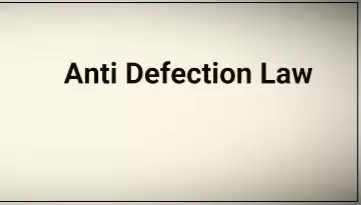What Is Anti-Defection Law And Its Exceptions & Advantages?

The anti-defection law enshrined through the introduction of the Tenth Schedule in the Constitution of India comprises 8 paragraphs.
The infamous “Aaya Ram, Gaya Ram” slogan was coined against the background of continuous defections by the legislators in the 1960s. The defection leads to instability in the government and affects the administration.
The Tenth Schedule was inserted in the Constitution in 1985. It lays down the process by which legislators may be disqualified on grounds of defection by the Presiding Officer of a legislature based on a petition by any other member of the House. A legislator is deemed to have defected if he either voluntarily gives up the membership of his party or disobeys the directives of the party leadership on a vote. This implies that a legislator defying (abstaining or voting against) the party whip on any issue can lose his membership of the House. The law applies to both Parliament and state assemblies.
The following is a brief summary of the contents of the law:
-
Paragraph-1: Interpretation. This section handles the definitions of distinct terms applied in laying out the legislation.
-
Paragraph-2: Disqualification on grounds of defection. This section deals with the crux of the legislation, specifying factors on which a member could be disqualified from the Parliament or the State assembly. Provisions in para 2.2(a) provide disqualification of a member if he or she "voluntarily gives up the membership of such political party", whereas paragraph 2.1(b) provisions, address a situation when a member votes or abstains from any crucial voting contrary to the directive circulated by his/her respective political party. Paragraph 2.2 states that any member, after being elected as a representative of a certain political party, shall be disqualified if he/she joins any other political party after the election. Paragraph 2.3 states that a nominated member shall be disqualified if he/she joins any political party after six months from the date he/she takes his seat.
-
Paragraph-3: Omitted after amending the schedule by the Ninety-first Amendment act – 2003, which exempted disqualifications arising out of splits with one-third of the members defecting from a political party.
-
Paragraph-4: Disqualification on ground of defection not to apply in case of a merger. This paragraph excludes from disqualification in the case of mergers of political parties. Provided if the said merger is with two-thirds of the members of the legislative party who have consented to merge with another political party.
-
Paragraph-5: Exemption. This paragraph provides exemptions to the Speaker, Chairman, and Deputy-Chairman of various legislative Houses.
-
Paragraph-6: Decision on questions as to disqualification on ground of defection. This provision mandates the Chairman or the Speaker of the respective legislative house to be the ultimate decision-making authority in case of any disqualification that arises.
-
Paragraph-7: Bar of jurisdiction of courts. This provision bars any court jurisdiction in case of disqualification of a member under this schedule. However, this schedule does not bar court intervention under articles 32, 226, and 137 of the Constitution of India.
-
Paragraph-8: Rules. This paragraph deals with framing the rules for disqualification. The schedule allows the Chairman and the Speaker to frame rules concerning their respective legislative houses to deal with the disqualification of members of their various houses of the legislature.
Exceptions Under The Law -
-
Legislators may change their party without the risk of disqualification in certain circumstances.
-
The law allows a party to merge with or into another party provided that at least two-thirds of its legislators are in favor of the merger.
-
Neither the members who decide to merge nor the ones who stay with the original party will face disqualification.
The law was amended in 2003. When it was enacted first, there was a provision under which if there occurs a split in the original political party and as a result of which one-third of the legislators of that party forms a separate group, they shall not be disqualified. This provision resulted in large scale defections and the lawmakers were convinced that the provision of a split in the party was being misused. Therefore, they decided to delete this provision. Now, the only provision which can be invoked for protection from disqualification is the provision relating to the merger, which is provided in Paragraph 4 of the 10th Schedule.
Advantages of anti-defection law:
-
Provides stability to the government by preventing shifts of party allegiance.
-
Ensures that candidates remain loyal to the party as well as the citizens voting for him.
-
Promotes party discipline.
-
Facilitates merger of political parties without attracting the provisions of Anti-defection
-
Expected to reduce corruption at the political level.
-
Provides for punitive measures against a member who defects from one party to another.
Disclaimer - This post is just for an information purpose, we do not claim any authenticity regarding the content of this post. If you find any content which is offensive or infringes on your intellectual property rights for any reason, you are free to contact and inform us at any moment. We will consider requests to remove the content but we are not obligated to or so or to respond to you directly.
